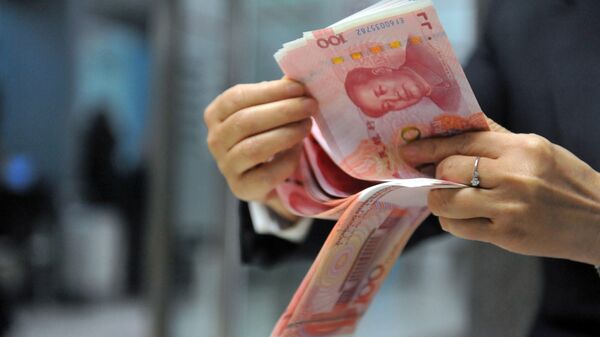Capital flight schemes looked at by Professor Christopher Balding show that those schemes used by ordinary citizens greatly exceed those of hedge fund managers such as George Soros.
George Soros' statements on bets against China's economy previously ignited a war of words between him and the China's official media. The overseas People's Daily headline stated "Declaring war on China’s currency? Ha ha" last week in an article criticizing Soros' remarks regarding China's economic downturn.
"The hedge funds we're talking about are simply a drop in the bucket compared to the amount of capital that is flowing out of China," professor of political economics at Peking University Christopher Balding told Sputnik.
Balding also described one of the accounting tricks used by Chinese firms is to buy dollars in China, rather than in Hong Kong. Low confidence in the Chinese yuan led exchanges in Hong Kong and other markets to price the yuan more than two percent lower than mainland markets, where the price is set by the Chinese central bank.
"Chinese firms last month reported about $36 billion in exports to Hong Kong, but Hong Kong customs reported only $24 billion in imports from China. So there's about $12 billion in phantom imports from China, and most likely that is essentially an accounting trick to move money into China. They can buy US dollars at a cheaper rate and then re-export those dollars later," Balding added.
Capital flight from China was identified as a growing issue after the August 2015 financial crisis. Not all capital outflow is bad, however. In 2015, one of the sources of capital outflow from China was identified as Chinese companies buying overseas assets, amounting to a fifth of all capital leaving China.
Financier George Soros is previously said to have profited from speculative attacks on the British pound in 1992 and Asian currencies during the 1997 financial crisis. His use of social engineering strategies labeled as philanthropy has also earned the ire of governments and political leaders in the US, Russia, China and other countries.
"Soros’s war on the renminbi and the Hong Kong dollar cannot possibly succeed — about this there can be no doubt," the People's Daily article said.
According to Balding, despite fears, hedge funds do not appear to have much of a handle on China's economy, by an order of magnitude.
"I don't think the hedge funds themselves have any real impact on the economy. The Chinese economy, in nominal terms, is trillions of dollars, these hedge funds are in the few billion dollars range. Even with significant leverage, this is not a significant impact on either the RMB or the Chinese economy," Balding told Sputnik.
Soros himself also did not mention the yuan in his remarks, instead saying that "China can manage it. It has resources and greater latitude in policies, with $3tn in reserves." His remarks on a possible "hard landing" for China's economy, however, could have been used by China to shore up domestic support in an attempt to stop capital flight.




